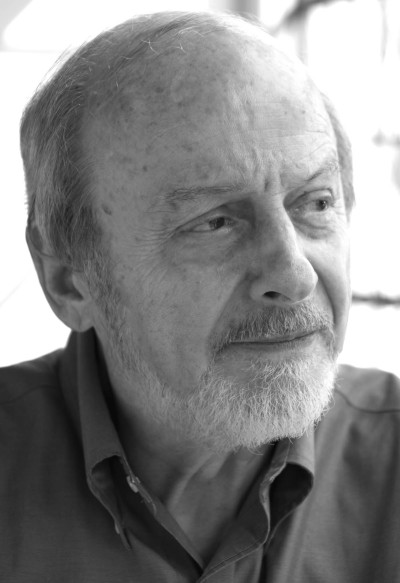E.L. Doctorow (Edgar Lawrence Doctorow)

Doctorow was born in The Bronx, the son of Rose (Levine) and David Richard Doctorow, second-generation Americans of Russian Jewish extraction who named him after Edgar Allan Poe. His father ran a small music shop. He attended city public grade schools and The Bronx High School of Science where, surrounded by mathematically gifted children, he fled to the office of the school literary magazine, Dynamo, which published his first literary effort. He then enrolled in a journalism class to increase his opportunities to write. Doctorow attended Kenyon College in Ohio, where he studied with the poet and New Critic John Crowe Ransom, acted in college theater productions and majored in philosophy. After graduating with honors in 1952, he completed a year of graduate work in English drama at Columbia University before being drafted into the United States Army. He served as a corporal in the signal corps, in Germany 1954–55 during the Allied occupation. He returned to New York after his military service and took a job as a reader for a motion picture company, where he said he had to read so many Westerns that he was inspired to write what became his first novel, Welcome to Hard Times. He began it as a parody of western fiction, but it evolved to be a serious reclamation of the genre before he was finished. It was published to positive reviews in 1960, with Wirt Williams of the New York Times describing it as “taut and dramatic, exciting and successfully symbolic.” When asked how he decided to become a writer, he said, “I was a child who read everything I could get my hands on. Eventually, I asked of a story not only what was to happen next, but how is this done? How am I made to live from words on a page? And so I became a writer.”
To support his family, Doctorow spent nine years as a book editor, first at NAL working with Ian Fleming and Ayn Rand among others; and from 1964, as editor-in-chief at Dial Press, publishing work by James Baldwin, Norman Mailer, Ernest J. Gaines, and William Kennedy, among others. In 1969, Doctorow left publishing to pursue a writing career. He accepted a position as Visiting Writer at the University of California, Irvine, where he completed The Book of Daniel (1971), a freely fictionalized consideration of the trial and execution of Julius and Ethel Rosenberg for giving nuclear secrets to the Soviet Union during the Cold War. It was widely acclaimed, called a “masterpiece” by The Guardian, and said by The New York Times to launch the author into “the first rank of American writers” according to Christopher Lehmann-Haupt. Doctorow’s next book, written in his home in New Rochelle, New York, was Ragtime (1975), later named one of the 100 best novels of the 20th century by the Modern Library editorial board. His subsequent work includes the award-winning novels World’s Fair (1985), Billy Bathgate (1989), and The March (2005), as well as several volumes of essays and short fiction.
Novelist Jay Parini is impressed by Doctorow’s skill at writing fictionalized history in a unique style, “a kind of detached but arresting presentation of history that mingled real characters with fictional ones in ways that became his signature manner”. In Ragtime, for example, he arranges the story to include Sigmund Freud and Carl Jung sharing a ride at Coney Island, or a setting with Henry Ford and J. P. Morgan. Despite the immense research Doctorow needed to create stories based on real events and real characters, reviewer John Brooks notes that they were nevertheless “alive enough never to smell the research in old newspaper files that they must have required”. Doctorow demonstrated in most of his novels “that the past is very much alive, but that it’s not easily accessed,” writes Parini. “We tell and retell stories, and these stories illuminate our daily lives. He showed us again and again that our past is our present, and that those not willing to grapple with ‘what happened’ will be condemned to repeat its worst errors.” Doctorow also taught at Sarah Lawrence College, the Yale School of Drama, the University of Utah, the University of California, Irvine, and Princeton University. He was the Loretta and Lewis Glucksman Professor of English and American Letters at New York University. In 2001 he donated his papers to the Fales Library of New York University. The library’s director, Marvin Taylor, said Doctorow was “one of the most important American novelists of the 20th century”. In 1954, Doctorow married fellow Columbia University student Helen Esther Setzer while serving in the U.S. Army in West Germany. The couple had three children: Richard, Jenny, and Caroline. Doctorow was a heavy smoker. He died of lung cancer on July 21, 2015, aged 84, in Manhattan.
Born
- January, 06, 1931
- USA
- The Bronx, New York
Died
- July, 21, 2015
- USA
- New York, New York
Cause of Death
- lung cancer



